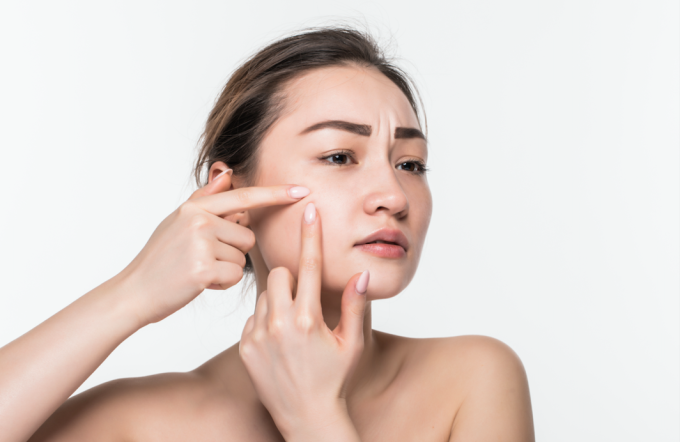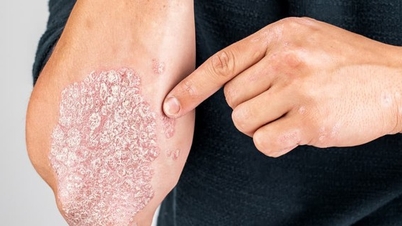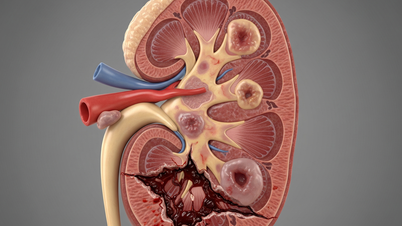Dry skin can be caused by washing your face too many times a day, infrequent use of moisturizers or exfoliants, and a poor diet.
Dry skin is very common and can affect many people regardless of age, gender, health, or skincare habits. The skin surface is often rough, flaky, itchy, and excessive scratching can cause damage and lead to infection.
If you moisturize regularly but your skin is still dry, you should review the following factors related to your habits, living environment, and health condition.
Taking too many showers or washing your face.
Frequent showering and face washing can strip away substances made from oils and various acids (amino acids, hyaluronic acid) that help keep skin naturally moisturized. These substances act as a barrier to retain moisture within the skin.
Similarly, frequent handwashing and the use of hand sanitizers can also dry out the skin. Many soaps are alkaline, causing irritation and stripping away natural moisture. Therefore, you should only wash your hands once or twice a day, gently patting your skin dry instead of scrubbing, then applying moisturizer.
Use scented products.
Fragrances in skincare products, laundry detergents, and fabric softeners can also cause irritation and dry skin. Women who frequently use scented products and have sensitive skin are at a higher risk of experiencing this problem.
Using expired moisturizer
If your moisturizer seems less effective than before, check the expiration date. While they usually have a long shelf life, the ingredients in the product can lose their effectiveness over time. Storing moisturizer in high-temperature areas such as near a window or stove can affect its quality.
Do not exfoliate.
Skin constantly sheds dry, dead cells and replaces them with new ones. Sometimes, dead cells accumulate on the skin's surface, making it look flaky. Exfoliating once a week helps keep skin smooth and allows it to absorb nutrients better.

Acne breakouts, coupled with a lack of exfoliation, can negatively impact the skin. (Image: Freeepik)
Hot bath
While a long, hot shower might feel pleasant, the heat and prolonged contact with the water can strip the skin of its natural oils. People should limit warm showers to a maximum of 10 minutes. Pat your skin dry with a towel instead of rubbing, then apply moisturizer.
Use an air conditioner.
Dry skin in the summer can also be caused by excessive use of air conditioning. Families can consider adding a humidifier to their home, especially if they live in a dry climate.
Go swimming
The chlorine in pool water also makes the skin more porous, causing moisture to escape. Chlorine can also cause redness, itching, swelling, or scaling of the skin. It's important to shower and moisturize after swimming.
Drink too little water.
Approximately 20% of the epidermis is water. Dehydration causes the skin to lose its elasticity. Drinking plenty of water can improve skin hydration and combat dryness.

Drinking enough water helps keep your skin healthy. Photo: Freepik
Nutritional deficiencies
Inadequate nutrition also affects skin health. Deficiencies in certain vitamins and minerals can prevent skin from being smooth and radiant. Important nutrients for healthy skin include zinc, vitamins B, C, D, and E. Fish oil, collagen, and hyaluronic acid should be supplemented through diet or supplements.
Age
As you age, the epidermis loses water and produces less oil, leading to dry, rough skin. According to the American Academy of Dermatology (AAD), most people experience dry skin by age 60. Older adults are also more likely to have medical conditions or use medications that cause dry skin.
Anh Ngoc (According to Verywell Health )
Source link



![[Photo] Prime Minister Pham Minh Chinh presides over the meeting of the Steering Committee for the Development of Science, Technology, Innovation, Digital Transformation and Project 06.](https://vphoto.vietnam.vn/thumb/1200x675/vietnam/resource/IMAGE/2026/02/25/1772024613089_1772024091685-jpg.webp)




![[Photo] Prime Minister Pham Minh Chinh receives the Director General of TASS News Agency (Russian Federation)](https://vphoto.vietnam.vn/thumb/1200x675/vietnam/resource/IMAGE/2026/02/25/1772024599891_dsc-8041-jpg.webp)




















































































![[Photo] Lung Phinh is covered in white plum blossoms.](https://vphoto.vietnam.vn/thumb/402x226/vietnam/resource/IMAGE/2026/02/25/1772036291497_tl-z7563533595318-d0f6815e01d4b292632a5f65d005af7d-8745-jpg.webp)


















Comment (0)